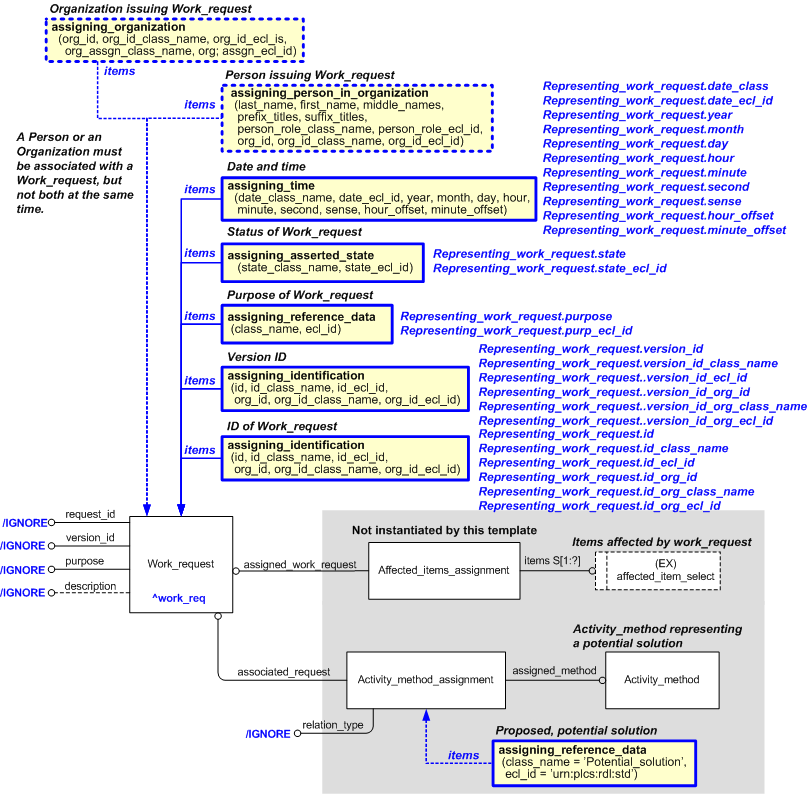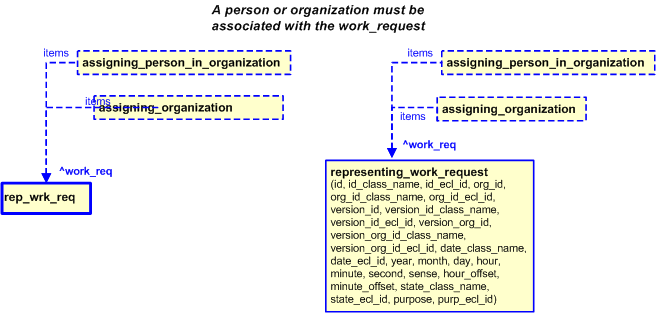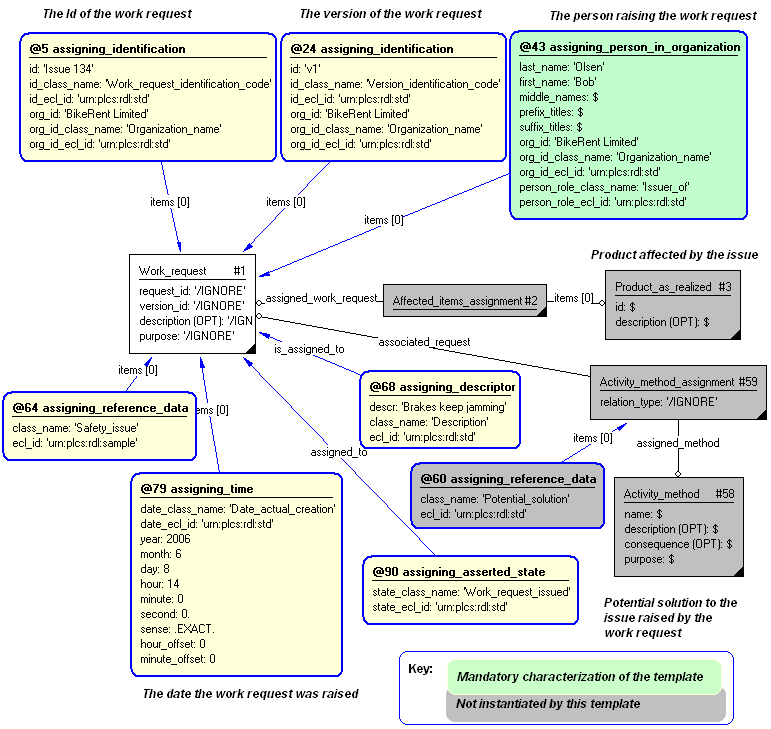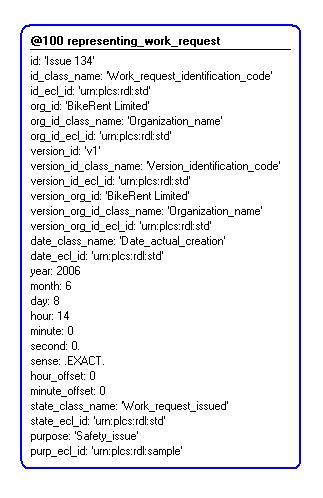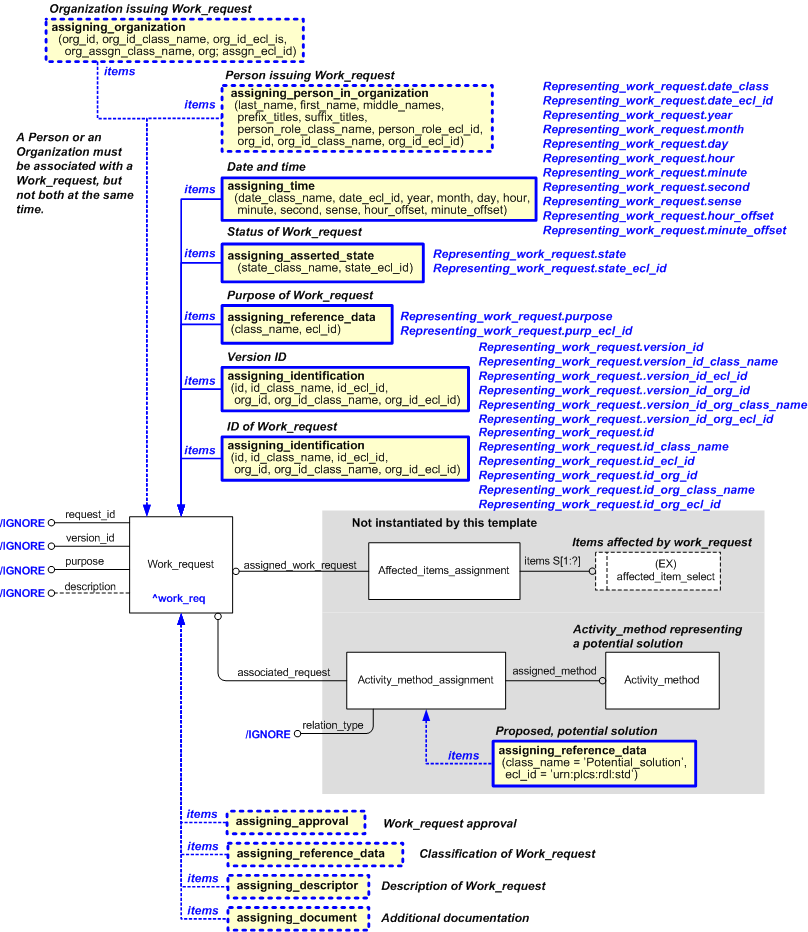Template:— representing_work_request (rep_wrk_req)
Capability:representing_work_request |
Date: 2008/02/21 16:29:46
Revision: 1.22
|
This section specifies the template representing_work_request.
NOTE
The template has been defined in the context of the capability
representing_work_request
which provides an overall description of the
relevant parts of the ISO 10303-239 information model and a description
of related templates.
NOTE
An explanation of a template and the associated instantiation path is
provided in the
Template overview
section.
This template describes how to represent a work request.
The EXPRESS-G diagram in
Figure
1
shows the templates and EXPRESS entities that are required
to represent the template
"representing_work_request".
The text highlighted in blue shows the template parameters.
Figure 1 — An EXPRESS-G representation of the Information model for representing_work_request
The graphic for the template to be used in other EXPRESS-G diagrams
is shown in Figure
2
below.
Figure 2 —
The graphical representation of representing_work_request template
The following input parameters are defined for this template:
id_class_name (Default=Work_request_identification_code,Type='CLASS')
The name of the class used to classify the identifier and so
provide the role or reason for the identification.
The following classes and their sub-classes can be used:
id_ecl_id (Default=urn:plcs:rdl:std,Type='URN')
The identifier of the organization that
"owns" the identifier.
The name of the class being used to classify the
identification of the organization. For example CAGE code.
The following classes and their sub-classes can be used:
The version identifier being assigned to the
Work_request.
NOTE
If the version is not known use /NULL.
The name of the class used to classify the identifier and so
provide the role or reason for the identification.
The following classes and their sub-classes can be used:
The identifier of the
External_class_library
storing the class provide by the input parameter @version_id_class_name
The identifier of the organization that
"owns" the version identifier.
The name of the class being used to classify the
identification of the organization that
"owns" the version identifier. For example CAGE code.
The following classes and their sub-classes can be used:
The identifier of the
External_class_library
storing the class provide by the input parameter @version_org_id_class_name.
The name of the class defining the role of the date assigned to the
Work_request
E.g. the date the
Work_request
was raised.
The following classes and their sub-classes can be used:
The identifier of the
External_class_library
storing the class provide by the input parameter @date_class_name.
The year component of the date and time the work request was raised.
The month component of the date and time the work request was raised.
The day component of the date and time the work request was raised.
The hour component of the date and time the work request was raised.
The minute component of the date and time the work request was raised.
This parameter is optional. If not given, it will remain unset.
The second component of the date and time the work request was raised.
This parameter is optional. If not given, it will remain unset.
The direction that the time the work request was raised is offset from Coordinated Universal
Time.
Enumeration values are: 'ahead', 'exact' or 'behind'.
The number of hours by which the time the work request was raised is offset from Coordinated Universal Time.
The number of minutes by which the time the work request was raised is offset from Coordinated Universal Time.
The value of this attribute need not be specified.
This parameter is optional. If not given, it will remain unset.
The class name of the
External_class
corresponding to the State_definition name.
The following classes and their sub-classes can be used:
The identifier of the
External_class_library
storing the definition of the class referenced by the parameter @state_class_name.
The following classes and their sub-classes can be used:
The identifier of the
External_class_library
storing the definition of the class referenced by the parameter @purpose.
The following reference parameters are defined for this template:
Allow the
Work_request
entity instantiated in this path to be referenced when this template is used.
Note: The
Work_request
entity can be referenced in a template path by:
%^target = $representing_work_request.work_req%
where
target
is the parameter to which the
Work_request
is bound.
The following parameter combinations specify a uniqueness constraint:
Unique constraint: Unique work request
Unique constraint: Unique work request version
Each instance of the
entity
(
Work_request)
within the data set shall be uniquely identified
by a combination of the following parameters on this
template (representing_work_request) namely:
id,
id_class_name,
id_ecl_id,
org_id,
org_id_class_name,
org_id_ecl_id,
version_id,
version_id_class_name,
version_id_ecl_id,
version_org_id,
version_org_id_class_name,
version_org_id_ecl_id.
The
instance is
referenced by the following template parameter:
work_req.
The instantiation path shown below specifies the entities that are to be
instantiated by the template.
A description of templates and the syntax for the instantiation path is
provided in the
Templates Help/Information section.
-- Instantiate a Work_request Work_request-- Bind the Work_request to the parameter ^work_req. -- The parameter is a reference parameter so the Work_request -- entity can be referred to when this template is used. %^work_req =
Work_request%
^work_req.description = '/IGNORE'
^work_req.purpose = '/IGNORE'
^work_req.request_id = '/IGNORE'
^work_req.version_id = '/IGNORE'
-- Identify the Work_request /
assigning_identification(
id=@id,
id_class_name=@id_class_name,
id_ecl_id=@id_ecl_id,
org_id=@org_id,
org_id_class_name=@org_id_class_name,
org_id_ecl_id=@org_id_ecl_id,
items=^work_req)/
-- Identify the Work_request version /
assigning_identification(
id=@version_id,
id_class_name=@version_id_class_name,
id_ecl_id=@version_id_ecl_id,
org_id=@version_org_id,
org_id_class_name=@version_org_id_class_name,
org_id_ecl_id=@version_org_id_ecl_id,
items=^work_req)/
-- Classify the work_request /
assigning_reference_data(
class_name=@purpose,
ecl_id=@purp_ecl_id,
items=^work_req)/
-- Assign a date to the Work_request /
assigning_time(
date_class_name=@date_class_name,
date_ecl_id=@date_ecl_id,
year=@year,
month=@month,
day=@day,
hour=@hour,
minute=@minute,
second=@second,
sense=@sense,
hour_offset=@hour_offset,
minute_offset=@minute_offset,
items=^work_req)/
-- Assign a state to the Work_request /
assigning_asserted_state(
state_class_name=@state_class_name,
state_ecl_id=@state_ecl_id,
assigned_to=^work_req)/
The following entities are instantiated with attributes as specified:
The instance diagram in Figure
3
shows an example of the EXPRESS entities and templates that are instantiated by the template:
/representing_work_request(id='Issue 134', id_class_name='Work_request_identification_code', id_ecl_id='urn:plcs:rdl:std', org_id='BikeRent Limited', org_id_class_name='Organization_name', org_id_ecl_id='urn:plcs:rdl:std', version_id='v1', version_id_class_name='Version_identification_code', version_id_ecl_id='urn:plcs:rdl:std', version_org_id='BikeRent Limited', version_org_id_class_name='Organization_name', version_org_id_ecl_id='urn:plcs:rdl:std', date_class_name='Date_actual_creation', date_ecl_id='urn:plcs:rdl:std', year='2006', month='6', day='8', hour='14', minute='0', second='0', sense='EXACT', hour_offset='0', minute_offset='0', state_class_name='Work_request_issued', state_ecl_id='urn:plcs:rdl:std', purpose='Safety_issue', purp_ecl_id='urn:plcs:rdl:sample')/
(an illustration of the consolidated representing_work_request template is shown in
Figure
4 below.)
Note that the mandatory characterization by the templates
assigning_descriptor and
assigning_person_in_organization
is shown in the diagram.
Namely:
@43 /assigning_person_in_organization(last_name='Olsen', first_name='Bob', person_role_class_name='Issuer_of', person_role_ecl_id='urn:plcs:rdl:std', org_id='BikeRent Limited', org_id_class_name='Organization_name', org_id_ecl_id='urn:plcs:rdl:std')/
and:
@68 /assigning_descriptor(descr='Brakes keep jamming', class_name='descr', ecl_id='urn:plcs:rdl:std')/
Figure 3 — Entities instantiated by representing_work_request template
The instance diagram in
Figure
4
shows the graphic symbol for the template that is to be
used in other instance diagrams. The example template is:
/representing_work_request(id='Issue 134', id_class_name='Work_request_identification_code', id_ecl_id='urn:plcs:rdl:std', org_id='BikeRent Limited', org_id_class_name='Organization_name', org_id_ecl_id='urn:plcs:rdl:std', version_id='v1', version_id_class_name='Version_identification_code', version_id_ecl_id='urn:plcs:rdl:std', version_org_id='BikeRent Limited', version_org_id_class_name='Organization_name', version_org_id_ecl_id='urn:plcs:rdl:std', date_class_name='Date_actual_creation', date_ecl_id='urn:plcs:rdl:std', year='2006', month='6', day='8', hour='14', minute='0', second='0', sense='EXACT', hour_offset='0', minute_offset='0', state_class_name='Work_request_issued', state_ecl_id='urn:plcs:rdl:std', purpose='Safety_issue', purp_ecl_id='urn:plcs:rdl:sample')/
Figure 4 — Instantiation of representing_work_request template
The following section details how the
representing_work_request
template can be optionally characterized by assigning
other constructs to it. These are characterizations commonly
applied to the template. The ISO 10303-239 EXPRESS model may enable
other assignments to the entities instantiated by the template.
The EXPRESS-G diagram in Figure
5
shows the possible characterizations of the template
"representing_work_request".
Figure 5 — Characterizations for representing_work_request template
The following characterizations may apply:
Characterization Assigning person or organization
NOTE this characterization is mandatory.
Characterization Assigning documentation
NOTE this characterization is optional.
Characterization Assigning dates
NOTE this characterization is optional.
Characterization Approvals
NOTE this characterization is optional.
